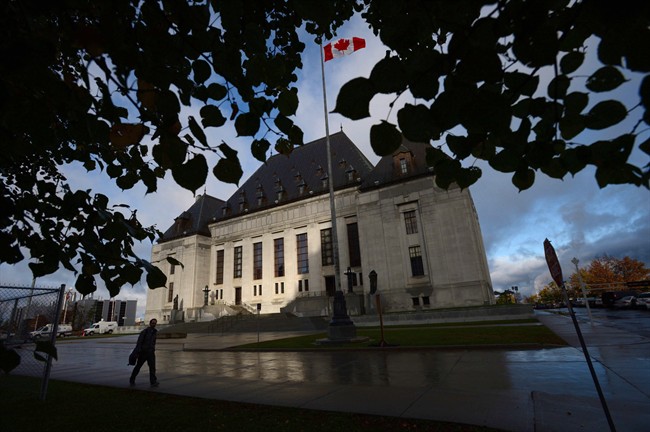OTTAWA – The Supreme Court of Canada has once again softened the Conservative government’s tough-on-crime agenda.

In a unanimous 7-0 ruling, the high court affirmed Friday that offenders can receive extra credit for time spent in custody before they are sentenced.
The Conservatives’ Truth in Sentencing Act placed a cap on the credit an offender could receive for their time in pre-trial custody. The 2009 law toughened the sentencing provisions for repeat and violent offenders by removing the long-held provision of giving an offender credit for double the time served.
The Tories removed the provision, but the law allowed for a credit of 1.5 times in exceptional circumstances.
The Supreme Court ruled Friday that pre-trial custody constitutes a circumstance that warrants the 1.5 credit.
“Had Parliament intended to alter the well-established rule that enhanced credit compensates for the loss of eligibility for early release, it would have done so expressly,” said the ruling, written by Justice Andromache Karakatsanis.
“I conclude that loss of access to parole and early release constitutes a ‘circumstance’ capable of justifying enhanced credit.”
Friday’s rulings were not constitutional cases, and they do not strike down any laws.
But they will serve as legal precedents that will provide guidance for judges when they sentence offenders.
- What is a halal mortgage? How interest-free home financing works in Canada
- Capital gains changes are ‘really fair,’ Freeland says, as doctors cry foul
- Budget 2024 failed to spark ‘political reboot’ for Liberals, polling suggests
- Peel police chief met Sri Lankan officer a court says ‘participated’ in torture
They also represent the latest in a series of rebukes of the Conservative government’s law and order agenda.
The Supreme Court examined three separate criminal cases, including one involving a young man convicted of manslaughter in the shaking death of his infant daughter, and who was given the 1.5 credit.
In May 2011, Sean Summers, then 20, had his eight-year sentence reduced to six years and eight months to credit him one and a half times for his time already served after he pleaded guilty and showed remorse for the crime.
“A rule that results in longer sentences for offenders who do not obtain bail, compared to otherwise identical offenders does not result in ‘similar … sentences imposed on similar offenders for similar offences committed in similar circumstances’,” said the ruling.
The ruling comes one day after the Supreme Court of Canada agreed to hear two more cases on whether the government’s changes to mandatory-minimum sentences for unlawful gun possession are constitutional.
One month ago, the high court struck also down retroactive changes to parole eligibility that the Conservatives had enacted. In that case, the high court ruled that the Abolition of Early Parole Act was unconstitutional because it imposed new punishment on people who had already been tried and sentenced.
The lower courts have also pushed back against the Tories’ crime agenda, as judges in at least three provinces have taken steps against a new mandatory victim surcharge, saying it places an unfair burden on those who don’t have the means to pay.
In those cases, the judges have either refused to order criminals to pay the mandatory surcharge or attempted to render it impossible for authorities to collect the fee.
The Supreme Court also dealt the Harper government another major setback last month when it rejected its appointment of Justice Marc Nadon, ruling that the semi-retired Federal Court of Appeal judge did not have the proper qualifications laid out in the Supreme Court Act for a Quebec nominee.



Comments